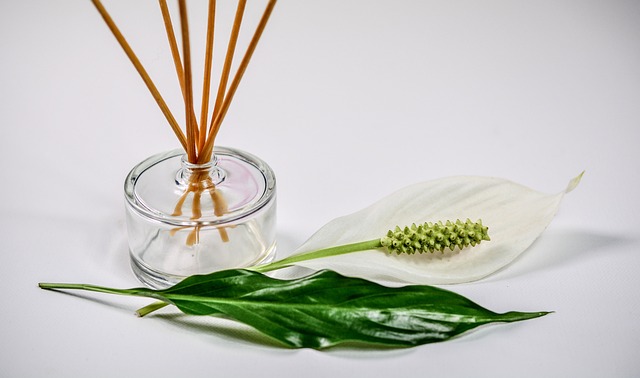
In today's high-pressure academic environment, students are constantly searching for effective ways to reduce exam stress.
Aromatherapy, with its natural and holistic approach, has emerged as a popular technique for promoting relaxation and focus during study sessions.
In this comprehensive guide, we will explore nine must-try aromatherapy techniques specifically tailored for students.
From essential oils for concentration to stress relief during exams, this ultimate guide aims to empower students with the tools they need to succeed while maintaining their mental and emotional well-being.
Essential Oils for Concentration
Essential oils can be effective in enhancing concentration and focus during studying and exams. When it comes to improving focus and enhancing productivity, certain essential oils have proven to be particularly beneficial.
One such oil is rosemary, which has been shown to stimulate the brain and improve cognitive function. Peppermint oil is another great option, as its invigorating scent can help to increase alertness and mental clarity. Additionally, lemon oil is known for its ability to promote concentration and boost mood.
Other essential oils that may aid in improving focus include lavender, eucalyptus, and frankincense. These oils can be used in various ways, such as through diffusers, inhalers, or applied topically.

Incorporating essential oils into your study routine can provide a natural and aromatic boost to help you stay focused and productive during your exams.
Study Time Diffuser Blends
To further enhance concentration and focus during study sessions, incorporating study time diffuser blends can be a valuable technique for students.
Aromatherapy for productivity has gained popularity among students as a natural and effective way to support their study efforts. Diffusing essential oils while studying has been found to have numerous benefits.
Firstly, certain essential oils such as rosemary and peppermint have been shown to improve cognitive function and memory. These oils can help students retain information better and recall it during exams.
Secondly, essential oils like lavender and chamomile have calming properties that can reduce stress and anxiety, creating a conducive environment for studying.
Lastly, diffusing essential oils can help create a positive and pleasant study atmosphere, promoting a sense of motivation and productivity.
Incorporating study time diffuser blends is a simple and enjoyable way for students to optimize their study sessions and achieve academic success.

Aromatherapy for Memory
The use of aromatherapy techniques to enhance memory has been increasingly recognized as a valuable tool for students seeking to improve their cognitive abilities.
Aromatherapy involves the use of essential oils that have been shown to have positive effects on the brain and memory function.
Certain essential oils, such as rosemary and peppermint, are known to improve cognitive function and enhance learning abilities.
These oils can be used in a variety of ways, such as diffusing them in a study area or applying them topically to pulse points.
When inhaled or absorbed through the skin, the molecules in the essential oils stimulate the brain and promote memory retention.
Incorporating aromatherapy into a study routine can provide an added boost to memory and overall cognitive performance.
Stress Relief During Exams
During the high-stress period of exams, it is important for students to find effective ways to manage their stress levels.

Two techniques that can provide stress relief during exams are breathing exercises and taking effective study breaks.
Breathing exercises, such as deep breathing or diaphragmatic breathing, can help students calm their minds and reduce anxiety.
Additionally, incorporating study breaks into their schedule can help students recharge and rejuvenate, improving focus and productivity.
Breathing Exercises for Stress
Students can alleviate exam stress by practicing effective breathing exercises.
Deep breathing and meditation techniques are powerful tools that can help students calm their minds and relax their bodies during the stressful exam period.
Deep breathing involves taking slow, deep breaths in through the nose, filling the lungs, and then exhaling slowly through the mouth. This technique helps to activate the body's relaxation response and reduce anxiety.
Meditation techniques, such as mindful breathing, can also be beneficial for stress relief. By focusing on the breath and bringing awareness to the present moment, students can quiet their racing thoughts and find a sense of calm.

Incorporating these breathing exercises into a daily routine can significantly reduce exam stress and promote a greater sense of well-being.
Effective Study Breaks
To maximize productivity and reduce exam stress, incorporating effective study breaks is essential for students during the intense exam period. Taking breaks allows the brain to rest and recharge, leading to improved focus and retention of information.
However, not all study breaks are created equal. Effective breaks involve activities that promote stress management and relaxation, such as going for a short walk, practicing deep breathing exercises, or engaging in mindfulness meditation. These activities help to clear the mind, reduce tension, and increase overall well-being.
It is important to choose breaks that align with personal preferences and interests, as this will enhance the effectiveness of the break. By implementing regular, effective study breaks, students can optimize their study sessions and ultimately improve their exam performance.
Essential Oils for Focus
When it comes to improving concentration, essential oils can be a valuable tool for students. Certain essential oils have been shown to enhance focus and mental clarity, making them a great option for those looking to boost their productivity during study sessions or exams.
In this section, we will explore some of the best essential oils that can help improve concentration and provide tips on how to incorporate them into your daily routine.
Best Essential Oils
One effective method for enhancing focus during exam preparation is to incorporate the use of specific essential oils known for their ability to promote concentration and mental clarity. Aromatherapy benefits students by providing a natural and holistic approach to reducing stress and increasing productivity.

Essential oils can be used in various ways, such as through inhalation or by using essential oil diffusers. Here are three of the best essential oils for focus:
- Rosemary: Known for its stimulating properties, rosemary essential oil can improve memory and cognitive function, making it ideal for studying and retaining information.
- Peppermint: This refreshing essential oil can invigorate the mind and boost alertness, helping students stay focused and energized during long study sessions.
- Lemon: With its bright and uplifting scent, lemon essential oil can enhance mental clarity and improve concentration, making it an excellent choice for students preparing for exams.
Incorporating these essential oils into your study routine can provide a natural and effective way to enhance focus and improve academic performance.
Improve Concentration With?
Three essential oils that have been proven to improve concentration and enhance focus are rosemary, peppermint, and lemon. These oils have unique properties that stimulate the brain and increase alertness, making them ideal for students looking to improve their focus and increase productivity during study sessions.
Rosemary oil has been shown to enhance memory and cognitive performance, while peppermint oil can help improve attention and mental clarity. Lemon oil, with its refreshing and uplifting scent, can also boost focus and concentration.
To use these oils for better focus, you can diffuse them in a diffuser, apply them topically, or inhale them directly from the bottle. Incorporating these essential oils into your study routine can provide a natural and effective way to improve focus and maximize your productivity.
Aromatherapy Breaks
To incorporate aromatherapy breaks into your study routine, consider taking regular intervals to engage in the practice of inhaling essential oils. Aromatherapy benefits have been proven to reduce stress and anxiety, improve focus and concentration, and enhance overall well-being.
Here are three ways you can make the most of your aromatherapy breaks:

- Choose the right essential oils: Different oils have different effects on the mind and body. For relaxation and stress reduction, try lavender or chamomile. For increased focus and mental clarity, consider peppermint or rosemary.
- Use a diffuser or inhaler: These tools can help you easily inhale the aroma of essential oils. Simply add a few drops of your chosen oil to the diffuser or inhaler and breathe in deeply during your breaks.
- Practice deep breathing: Combine the benefits of aromatherapy with deep breathing exercises. Inhale slowly and deeply, allowing the scent of the essential oil to fill your lungs. Exhale slowly, releasing any tension or stress. Repeat this process for a few minutes, focusing on your breath and the aroma of the oil.
Essential Oils for Good Sleep
Incorporating the benefits of aromatherapy breaks into your study routine can also help promote good sleep through the use of essential oils.
Essential oils have long been recognized for their calming and soothing effects on the mind and body, making them an ideal solution for those struggling with anxiety and sleep issues.
Lavender oil, for example, is known for its relaxing properties and can help reduce anxiety and improve sleep quality. Other essential oils like chamomile, bergamot, and ylang-ylang also have similar anxiety-relieving and sleep-enhancing benefits.
Aromatherapy for Study Sessions
To enhance focus and concentration during study sessions, students can utilize the benefits of aromatherapy. Aromatherapy involves the use of essential oils for productivity and overall well-being. When used correctly, essential oils can have a positive impact on cognitive function and help students stay alert and focused.
Here are three ways aromatherapy can benefit students during their study sessions:
- Improved concentration: Certain essential oils, such as rosemary and peppermint, have been found to enhance cognitive performance and improve concentration. Diffusing these oils in the study area can help students stay focused and retain information better.
- Stress reduction: Aromatherapy can help reduce stress and anxiety, which are common during exams. Oils like lavender and chamomile have calming properties that promote relaxation and create a peaceful study environment.
- Increased energy: Essential oils like lemon and grapefruit have invigorating scents that can boost energy levels and combat fatigue. Inhaling these oils or using them in a diffuser can provide a natural energy boost, keeping students alert and motivated during their study sessions.
Essential Oils for Relaxation
Students can benefit from incorporating essential oils known for their relaxation properties into their study routine. Essential oils have been used for centuries for their therapeutic effects on the mind and body.
When it comes to relaxation, certain essential oils have proven to be particularly effective. Lavender oil, for example, is well-known for its calming and soothing properties, making it an ideal choice for promoting sleep and reducing anxiety. Another popular essential oil for relaxation is chamomile, which is often used to relieve stress and promote relaxation. Other essential oils that can help with relaxation include bergamot, ylang-ylang, and clary sage.

These oils can be used in diffusers, added to bathwater, or applied topically with carrier oils. Incorporating essential oils into your study routine can help create a peaceful and relaxing environment, allowing you to focus better and manage exam stress more effectively.
Frequently Asked Questions
Can Aromatherapy Completely Eliminate Exam Stress?
While aromatherapy can be beneficial for reducing exam stress, it may not completely eliminate it. Essential oils have been found to have calming effects and promote relaxation, but individual results may vary.
Are There Any Potential Side Effects of Using Essential Oils for Concentration?
When using essential oils for concentration, it is important to be aware of potential side effects and take necessary safety precautions. Understanding these risks can help ensure a safe and effective aromatherapy experience.
How Long Do the Effects of Aromatherapy Last During Study Sessions?
The effects of aromatherapy during study sessions can vary, but research suggests that the benefits of aromatherapy can have long-term effects on focus, concentration, and stress reduction, making it a valuable tool for students.
Can Aromatherapy Be Used as a Substitute for Other Stress-Relief Techniques During Exams?
Aromatherapy can be an effective stress relief technique for students during exams. It offers numerous benefits, such as promoting relaxation, improving focus, and reducing anxiety. However, it should not be seen as a substitute for other stress-relief techniques.
Are There Any Essential Oils That Should Be Avoided During Study Sessions Due to Their Stimulating Effects?
When using aromatherapy techniques for studying, it is important to be aware of the stimulating effects of certain essential oils. Some oils, such as peppermint or rosemary, can increase alertness and may not be suitable for all study sessions. Safety precautions should be taken when incorporating these oils into a study routine.
Conclusion
In conclusion, incorporating aromatherapy techniques into your study routine can be a beneficial way to reduce exam stress and improve focus.

Essential oils such as lavender, rosemary, and lemon can help enhance concentration, memory, and relaxation. Diffusing these oils during study sessions and taking aromatherapy breaks can provide a refreshing and calming environment.
Additionally, using specific oils for stress relief and promoting good sleep can further support a successful and productive academic journey.
 Business & FinanceHealth & MedicineTechnologyLifestyle & CultureScience & EnvironmentWorld NewsPrivacy PolicyTerms And Conditions
Business & FinanceHealth & MedicineTechnologyLifestyle & CultureScience & EnvironmentWorld NewsPrivacy PolicyTerms And Conditions
